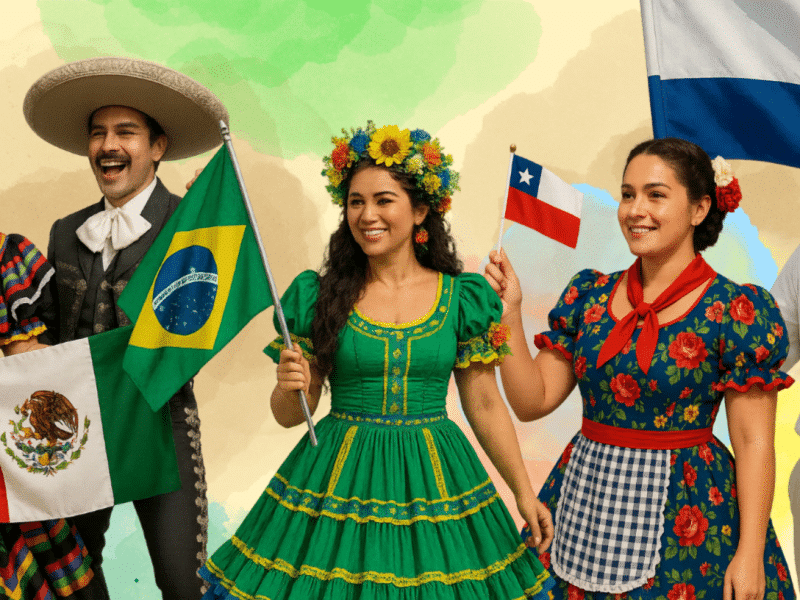Cultural Shifts: The Evolving Dynamics in Latino Families
Migration profoundly shapes the Latino community, sparking notable shifts in family dynamics. From first-generation immigrants often holding on to outdated traditions to first-generation Latino-Americans confidently challenging them, we explore the ways in which Latino culture is changing – and not changing.

The dynamics within Latino families are experiencing significant transformations, particularly around values and cultural traditions. In many Latino families, older generations tend to hold onto conventional and strict norms. However, the second-generation of Latine Americans, those born in the U.S. with at least one immigrant parent, tends to include an increase in Latinas who are shedding obsolete notions and traditions and challenging these dynamics with a more open mindset.
This generational shift is paving the way for even more cultural change amongst the third-generation, creating a fascinating, and often stressful, intergenerational dynamic.
First-Generation: A Retrospective View
Most of these Latinos usually stick to traditional roles that are deeply rooted in our cultural background. Behaviors based on the patriarchal structure, machismo, and marianismo persistently endure, expecting women to assume domestic responsibilities and prioritize the family over personal ambitions. This pushes a narrative that overlooks their individual dreams and potential beyond conventional roles.
Second-gen Latinas often have firsthand experience with intrusive questions from family members, reflecting rigid views on what women should be, and what they are expected to do with their lives.
The cultural values of many of these Latino relatives are anchored in maintaining the family unit and defending the beliefs passed on from generation to generation. Sacrifice and dedication are expected and often go unnoticed or acknowledged as newer generations struggle to balance tradition with cultural change. This often leads to higher rates of mental health issues, often referred to as “first-generation trauma.”
As the children of immigrants struggle to adapt, these first-generation immigrants also have to process the change and resistance to their outdated views and behaviors that they often don’t even realize are problematic.
Second-Generation: Transitioning Perspectives
As Latino families assimilate new paradigm shifts and embrace opportunities in more diverse societies, the second-generation is at the forefront of a mindset transformation, mirroring a historical pattern observed in various immigrant groups in the U.S., where these individuals tend to follow fewer cultural restrictions than previous generations.
Many have been influenced by diverse perspectives, education, and professional opportunities, and are challenging traditional gender roles with confidence and conviction.
The second-generation is boldly pursuing career and personal goals that were unthinkable and unattainable to their parents while maintaining a balance between staying true to who they are, honoring their cultural values, and acknowledging what needs to change.
In her personal essay titled “Celebrating Latinas,” Fabiola Robles, who identifies as a Latinx scholar, wrote, “I know I’m not the only one that experienced this, why does it feel like a choice for Latinas? The academic life or the family life? We can have both. We should have both, and we should also celebrate it.”
Empowering Third-Generation Latino Youth
Now, we have aunts and uncles who, instead of asking, “Y el novio, mija?” are actively embracing their role as catalysts for continued transformation. They support today’s youth in forging paths free from the constraints of family and social expectations that were once restrictive for them and their parents.
Many times, it’s the family crew itself —be it from aunts, uncles, and godmothers—who not only provide emotional encouragement but also offer tangible assistance, including financial support. And sometimes, that support extends beyond the immediate family to community networks, where open-mindedness becomes a driving force for nurturing positive transformations.
Latine Perspectives on Change
The changing dynamics within Latine families are not without challenges. The shift in mindset often creates tension between generations, as older members grapple with changing traditions. Nevertheless, numerous Latine families are handling these changes with grit, sticking to their cultural roots while still rolling with the progress.
Latine voices are crucial in this conversation, offering unique perspectives on the intersectionality of culture, gender, and generational change.
As Robles writes in her essay, “Let’s normalize celebrating our accomplishments outside of traditional female roles. I want to normalize having a madrina (godmother) de los college textbooks and a padrino (godfather) for the gas money to visit home. Another set of godparents to help purchase dorm gear and a madrina who sends you quarters for laundry. Si, send the ramen y las cobijas (blankets), we need all the support we can get. Imagine if our college graduation announcements had as much pomp and circumstance as those long wedding invites with all the madrinas and padrinos sponsoring the events? Te imaginas?”
By engaging in open conversations, building mutual understanding, and collectively upholding family values, Latine families are creating a more inclusive environment that empowers individuals across all generations.



